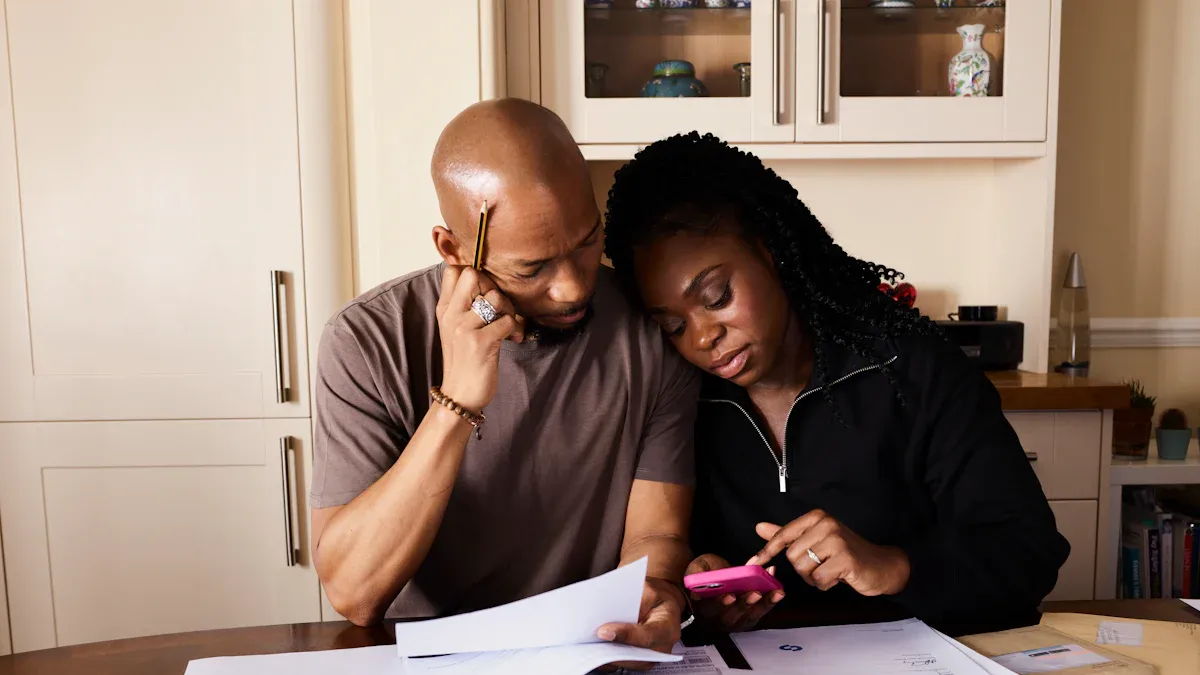Money affects dating in more ways than you might expect. When you and your partner have different views on spending or saving, it can lead to stress or frustration. Research shows that if you believe your partner spends too much or too little, it can decrease your happiness and loyalty in the relationship. However, when both of you share the same financial values, you tend to experience greater trust and joy. Being open about money, setting clear guidelines, and understanding each other’s financial habits can strengthen your connection.
Key Takeaways
Money can make people worry in relationships, but talking honestly helps stop arguments and builds trust.
Having the same ideas about spending and saving makes couples feel happier and closer.
Begin talking about money early when dating to learn about each other’s habits and avoid problems later.
You do not have to spend much money to have fun dates; easy activities can make good memories.
Respect and working together on money choices help your relationship stay fair and strong.
Money Affects Dating: Core Impacts
Financial Stress in Relationships
Money can bring a lot of stress into your relationship. When you and your partner do not agree about spending or saving, you might notice more arguments and tension. You may feel anxious or even insecure about your future together. Here are some common ways financial stress shows up in relationships:
You and your partner argue more often about money, like how much to spend or save.
You might feel worried or unstable, which makes it hard to talk openly.
Money fights can bring up old problems or make you feel less connected.
Sometimes, you or your partner may become distant or irritable, which can hurt your bond.
Studies show that over half of couples argue about money more than any other topic.
When you do not solve these money problems, the stress can build up. Research shows that couples who fight about money often have more conflict and are more likely to break up. If you do not have a plan for your finances, the stress gets worse. But if you talk openly and work together, you can lower your stress and feel closer as a team.
Tip: Try to set aside time each week to talk about money. Even a short chat can help you both feel more secure.
Dating Opportunities and Social Status
Money affects dating in many ways, especially when it comes to the chances you get to meet new people or go on dates. If you have a higher income or come from a wealthy background, you might have more options for where to go and who to meet. People often notice things like clothes, jobs, or even what you post online. These signals can make someone seem more attractive, especially for men.
People from wealthier families often feel safer and can focus on finding someone who matches their interests or values. They look for emotional connection and self-fulfillment. If you come from a family with less money, you might worry more about making ends meet. This can make it harder to focus on romance or deep connections.
Girls often care more about a partner’s ambition and education, which are signs of social status.
Boys may care about social status, but only if the partner is also attractive.
As you get older, social status becomes more important in choosing a partner.
People usually pick partners with similar social status and attractiveness.
Social status can help you meet more people, but kindness and compatibility matter too.
Note: Social status can open doors, but real happiness comes from finding someone who shares your values and treats you with respect.
Financial Compatibility
Financial compatibility means you and your partner have similar views about money. This does not mean you must earn the same amount, but you should agree on how to spend, save, and plan for the future. If you come from different backgrounds, you might see money in very different ways. One of you may like to save every penny, while the other enjoys spending on fun things. These differences can cause tension unless you talk about them openly.
Here are some steps to build financial compatibility:
Talk honestly about your money habits, debts, and goals.
Respect each other’s background and how you learned about money.
Set shared goals, like saving for a trip or buying a home.
Watch out for red flags, like hidden debts or secret spending.
Check in regularly to review your finances together.
Challenge old ideas about who should handle money.
Make a budget together and ask for help if you need it.
When you and your partner work as a team, you feel more secure and happy. Couples who share financial goals and talk openly about money have less stress and more trust. You can plan for big dreams, like owning a house or saving for retirement, and feel confident about your future together.
Financial compatibility leads to more happiness and stability.
Open talks about money build trust and prevent secrets.
Working together on money goals makes your relationship stronger.
Remember: Money affects dating, but honest conversations and teamwork help you build a lasting bond.
Financial Differences

Income Gaps
Income gaps happen in many relationships. Sometimes, you make more money than your partner. Other times, you might earn less. These differences can cause stress and fights. If you have less money, you may worry about paying bills. You might feel pressure to keep up with your partner’s spending. Some couples split costs evenly, but that can feel unfair. It is hard if one person earns much more.
How you feel about your money is very important. It matters more than the amount you have. If you feel stressed, you might argue more. You may also feel less happy in your relationship. Big income gaps can change how you see each other. You might feel less important or unsure about your place. Talking about money helps you avoid bad feelings. It keeps your relationship strong.
Tip: Talk about money early and often. Honest talks help you both feel equal and respected.
Spending Habits
Spending habits can cause many problems. Maybe you like to save money. Your partner might like to spend more. These differences often lead to fights. The problem is not always how much money you have. It is about how you use it together. Couples say money fights make them stressed. It can even hurt their happiness.
Here’s a quick look at common spending habit conflicts:
Conflict Type | Description | Impact |
|---|---|---|
One spends, one saves | High risk of arguments | |
Perceptions of Overspending | Feeling partner spends too much | More fights and stress |
Poor Communication | Not talking about money | More misunderstandings |
Financial Worries | Worrying about debt or bills | Less trust and satisfaction |
You can have fewer fights by talking about your goals. Share your worries and make choices together. When you work as a team, you build trust. This helps your relationship stay healthy.
Power Dynamics
Money Affects Dating by changing who makes choices. If one person earns much more, they may decide how to spend money. The other person might feel left out or powerless. Sometimes, the higher earner controls the money. This can make the other person feel trapped. These problems can hurt your confidence and freedom.
You can fix power struggles by:
Talking about money and making choices together.
Respecting each other’s efforts, not just income.
Being open about your goals and worries.
Noticing and celebrating things like caring for the home.
Note: Respect and teamwork help you share power and keep things fair.
Money Conversations
When to Talk About Money
You might wonder when you should start talking about money with someone you are dating. Experts say it is best to start early, usually after a few months of dating but before making big decisions like moving in together or starting a family. Early talks help you learn about each other’s habits and values. You do not need to share every detail right away. Start with small topics, like how you feel about saving or spending. As you get closer, you can talk about bigger things, like debt or future plans.
Here are some tips for starting money talks:
Pick a calm, private time to chat.
Avoid talking about money when you are upset.
Share your own habits first to make your partner feel safe.
Ask open questions, like “How did you learn about money?”
Regular check-ins about money help you stay on the same page and avoid surprises.
Red Flags
Some money habits can cause problems in relationships. Watch out for these red flags:
Refusing to talk about money at all.
Hiding debts or secret spending.
Controlling or limiting your access to money.
Taking big risks, like gambling or skipping meals to save.
Not letting you spend on fun or relaxation.
If you notice any of these, do not ignore them. Honest talks can help, but sometimes you may need outside help if things do not change.
Building Trust
Trust grows when you are open about money. Share your goals and worries. Listen to your partner and respect their views. Make plans together, like saving for a trip or setting a budget. Be honest about mistakes and work as a team to fix them. When you both feel safe to share, you build a strong bond.
Money Affects Dating, but trust and teamwork make your relationship last.
Budget-Friendly Dating

Creative Date Ideas
You do not need lots of money to have fun. Many great dates are cheap but help you feel close. Try painting together at home. You can laugh and be creative. You will remember these moments. Cooking a meal together helps you learn about each other’s likes. You also learn about your backgrounds. If you enjoy being outside, go hiking or walk on a trail. This gives you time to talk and enjoy nature. Picnics, visiting gardens, or watching the sunset can feel special and romantic.
Play board games or card games for some friendly fun.
Listen to music at a record store or share favorite songs.
Volunteer together for a cause you both like.
Have a themed night or puzzle night at home.
Tip: The best dates are about spending time together, not spending money. Laughing and enjoying simple things make your bond stronger.
Managing Expectations
Talking about money can feel weird, but it is important. It helps to set clear rules early. You may come from different backgrounds or have different ideas about spending. Start by sharing what makes you comfortable. Decide together how to split costs or take turns paying. Set rules for your own spending and shared costs. Check in often about money to avoid surprises and keep things fair.
Decide which costs to share and which to keep separate.
Make money talks a normal part of planning dates.
When you work as a team with money, you build trust and avoid problems.
Shared Experiences
Doing things together matters more than expensive gifts. When you share activities, you make memories that last. Cooking, walking, or planning small adventures brings you closer. These moments help you grow as a couple and feel happier.
Shared Experience | Lasting Impact |
|---|---|
Cooking together | Builds teamwork and fun |
Hiking or walking | Helps you talk deeply |
Volunteering | Makes your values stronger |
Watching sunsets | Makes romantic memories |
Remember: Experiences bring more happiness than gifts. Focus on making memories, not spending money.
Money Affects Dating in many ways, but you can build a strong relationship by focusing on trust, respect, and shared goals. Research shows that open talks about money help you avoid fights and feel closer. When you work as a team, you turn financial stress into teamwork. Try these steps:
Talk about money early and often.
Set shared goals and make a budget together.
Check in regularly and support each other.

Remember, your values and how you treat each other matter more than your bank account.
FAQ
How soon should you talk about money when dating?
You can start talking about money after a few months. Share your habits and goals early. This helps you avoid surprises and builds trust. Try asking simple questions about saving or spending.
What if you earn much less than your partner?
You might feel nervous or left out. Honest talks help you both feel equal. You can split costs in a way that feels fair. Focus on teamwork, not just money.
Can money problems break up a relationship?
Yes, money fights can cause stress and even breakups. You can lower stress by talking openly and making plans together. Trust and respect matter more than your bank account.
Are budget dates less romantic?
Not at all! You can make great memories with simple dates. Try cooking together, hiking, or playing games. Shared experiences bring you closer and help you laugh together.









